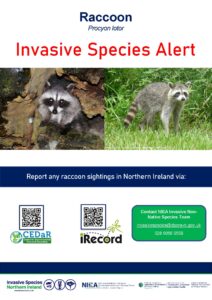Raccoon
Procyon lotor
Overview
Photo credit: ©Carsten Volkwein-2007
Procyon lotor
Origin and Worldwide Distribution:
Potential or Known Impacts:
How did it/could it get here?
Is it found in Northern Ireland?
Methods for Prevention:
You can help by reporting any sightings: @ the Centre for Environmental Data & Recording (CEDaR) - Or via the iRecord App.
Current Legislative Position (Listed on 03 August 2016)
 For further queries, you can contact the Invasive Non Native Species (INNS) Team in the Northern Ireland Environment Agency on 028 9056 9558 or Email: invasivespecies@daera-ni.gov.uk
For further queries, you can contact the Invasive Non Native Species (INNS) Team in the Northern Ireland Environment Agency on 028 9056 9558 or Email: invasivespecies@daera-ni.gov.uk
Procyon lotor
Common Names:
Habitat:
Description:
- Raccoon
Habitat:
- Woodland, forest, urban areas, agricultural lands.
Description:
- The raccoon is a medium-sized omnivore originating from Central and North America with a distinctive black eye mask and a ringed bushy tail.
Origin and Worldwide Distribution:
- This species originates from Central and North America. It was brought into Europe in the mid-20th century for the zoo, pet and fur trades and has since escaped into the wild.
- It is now present in Austria, Belgium, Croatia, the Czech Republic, Denmark, France, Germany, Hungary, Ireland, Italy, Luxemburg, Poland, Romania, Slovakia, Slovenia and Spain.
- Raccoons can survive in a wide range of habitats.
Potential or Known Impacts:
- They are omnivorous and opportunistic, eating eggs, chicks and adult birds, especially waterfowl. Their impact on biodiversity can be severe, especially in Natura 2000 wetlands.
- They are also known to damage fruit trees, vineyards and chicken farms and they carry important diseases and parasites, such as rabies, roundworms and toxoplasmosis.
How did it/could it get here?
- It arrived here through fur farms, zoos and private ownership, before escaping into the wild.
Is it found in Northern Ireland?
- It is not present in Northern Ireland.
- Further distribution details can be found on NBN Atlas NI here.
Methods for Prevention:
- A sales ban, the phasing out from zoos, collections or any other ownership, a rapid eradication of any newly emerging populations, and the management of established populations should prevent the species from invading the rest of the EU.
- Report all sightings.
You can help by reporting any sightings: @ the Centre for Environmental Data & Recording (CEDaR) - Or via the iRecord App.
Current Legislative Position (Listed on 03 August 2016)
- This species must not intentionally be brought into the Union; kept; bred; transported to, from or within the United Kingdom, unless for the transportation to facilities in the context of eradication; placed on the market; used or exchanged; permitted to reproduce, grown or cultivated; or released into the environment.
NIEA Invasive Species Alert Poster - Raccoon: Download
 For further queries, you can contact the Invasive Non Native Species (INNS) Team in the Northern Ireland Environment Agency on 028 9056 9558 or Email: invasivespecies@daera-ni.gov.uk
For further queries, you can contact the Invasive Non Native Species (INNS) Team in the Northern Ireland Environment Agency on 028 9056 9558 or Email: invasivespecies@daera-ni.gov.uk 
